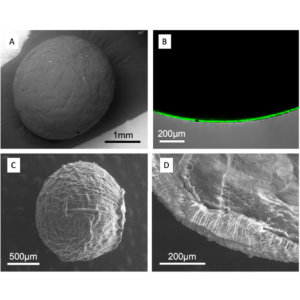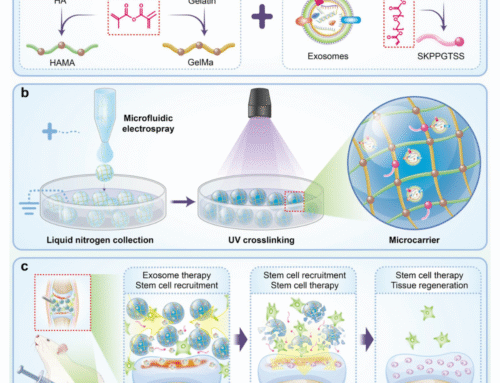Did you know that microbeads or microcarriers can transform the delivery of functional food ingredients? These tiny, natural carriers, made from pectin and chitosan, are designed to protect sensitive nutrients like probiotics, vitamins, and other bioactive compounds from the harsh conditions of the stomach. A recent study published in Foods (2024) reveals the potential of these innovative microbeads to ensure controlled release of ingredients in the intestines, optimizing their effectiveness in functional foods.

Microbead structure shown by electron microscopy (A, C, D) and confocal microscopy (B), with green indicating chitosan.
What Are Microbeads and How Do They Work?
Microbeads are small, spherical particles that act as delivery vehicles for functional food ingredients. In this study, researchers used pectin and chitosan to create hydrogel microbeads through electrostatic droplet generation. These beads are designed to remain stable in the stomach and release their contents in the intestines, ensuring that the functional ingredients reach their target destination intact.
By fine-tuning the formulation and processing conditions, such as the voltage during bead formation, the researchers were able to control the size of the microbeads, ranging from 1.5 mm to 4 mm. This flexibility in size makes microbeads highly adaptable for various functional food applications.
Key Results of the Study:
- Size and Shape Control:
- Microbeads were produced with customizable sizes, ranging from 1.5 mm to 4 mm, by adjusting the voltage during the electrostatic droplet generation process.
- The microbeads maintained a spherical shape, crucial for consistent release and application in functional food products.
- Protective Chitosan Coating:
- The chitosan coating formed a protective shell around the pectin core, confirmed through advanced imaging techniques like confocal laser scanning microscopy.
- This coating prevented premature release of encapsulated ingredients in the stomach’s acidic environment, ensuring release occurs in the intestines.
- Stability in Gastric Fluids:
- Microbeads remained stable in simulated gastric fluids (pH 3), meaning they withstood the stomach’s acidity without degrading.
- They maintained their integrity for up to 180 minutes in these harsh conditions, ideal for delivering sensitive ingredients like probiotics.
- Targeted Release in the Intestines:
- The microbeads began to disintegrate in simulated intestinal fluids (pH 7), ensuring the functional ingredients were released at the optimal stage of digestion.
- This controlled breakdown offers enhanced bioavailability of nutrients, maximizing their health benefits.
- Customizable for Different Applications:
- The ability to tailor bead size and release profile by altering the processing conditions makes these microbeads adaptable for various functional food products and supplements.
Why Microbeads Are the Future of Functional Food Delivery

Mean diameter of hydrogel beads (2.2 wt.% pectin with/without 2.2 wt.% chitosan CsH) during incubation in simulated gastric (SGF) and intestinal fluids (SIF). Particle size was 4–5 mm, with a sphericity factor of 0.93–0.95.
The development of pectin-chitosan microbeads offers a highly effective way to deliver bioactive compounds in functional foods. These microcarriers ensure that sensitive ingredients are protected from the harsh environment of the stomach and released in the intestines, where they can provide maximum nutritional benefit. The results of this study highlight the customizable nature of these microbeads, making them a valuable tool for improving bioavailability in functional food products.
Conclusion
Microbeads, especially those made from pectin and chitosan, represent an advancement in the field of functional food ingredient delivery. Their ability to protect sensitive ingredients and ensure controlled release in the intestines makes them ideal for enhancing the effectiveness of probiotics, vitamins, and other bioactive compounds. As this study shows, the future of functional food technology lies in innovative solutions like these microbeads, which promise to improve both the stability and bioavailability of functional ingredients.
Interested in using microcarriers for food delivery? Check out our product page.
For more tailored solutions, contact our team.
Read the full article, here.






Leave A Comment